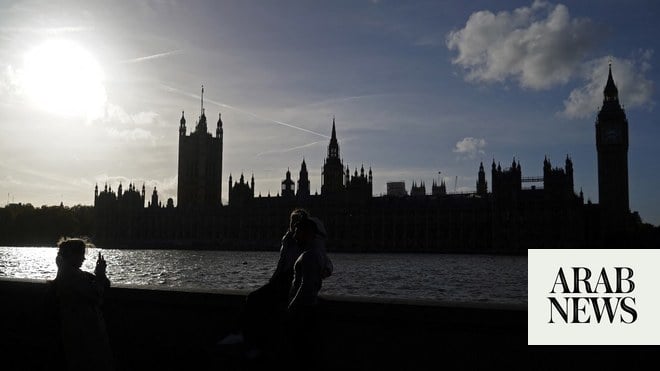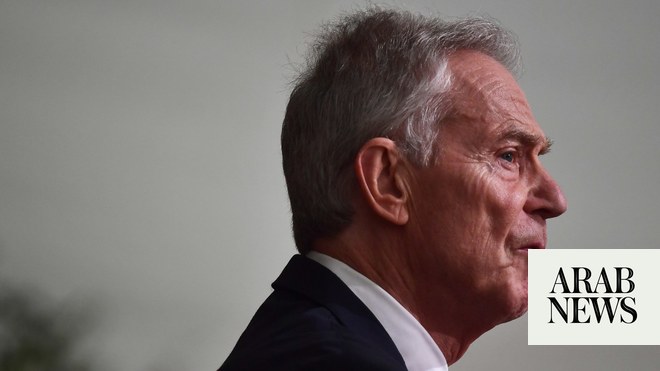
Organizations stir up resentment by portraying Muslims in Britain as victims and alienated, report finds
Divisive ideas about the place of Muslims in the West are "threatening social cohesion"
LONDON: Former British prime minister Tony Blair has accused some Muslim organizations in Britain of spreading views that often mirror those of extremists.
While they are non-violent, such groups stir up resentment by portraying Muslims in Britain as victims, alienated from British society and in constant conflict with the non-Muslim world.
Most disturbingly, they “promote a worldview that significantly overlaps with that of a proscribed Islamist extremist organisation, Al-Muhajiroun” - a banned group which does espouse violence.
The allegations appear in a report from the Tony Blair Institute for Global Change - the think tank Blair founded after leaving office - and names four groups: CAGE, Hizb ut-Tahrir Britain, the Muslim Public Affairs Committee UK and Islamic Human Rights Commission.
The messaging of all 5 groups we studied is worrying because it conveys a deep divide between Muslims & non-Muslims in the UK, particularly with the government, which most of these groups actively seek to delegitimise https://t.co/YhVYHucWt5
— Tony Blair Institute (@InstituteGC) January 18, 2019
The report identifies six “key themes” shared by all four groups: Victimization, opposition between “good” and “bad” Muslims, opposition between Islam and the West, a delegitimization of the government, making Islam central to national politics and justification of violence.
“There is a range of views on these six themes, with differing degrees of severity from mainstream to extreme,” the report says. Of the four, Hizb ut-Tahrir comes close to sharing Al-Muhajiroun’s stance on violence.
Banned since 2000, Al-Muhajiroun notoriously dubbed those behind the Sept. 11 attacks “the Magnificent 19” and several of the group’s adherents have perpetrated other atrocities.
The report warns that such a “corrosive narrative” promoting divisiveness between Muslims and non-Muslims can only embolden the far right and calls on the UK government to establish “a working definition of extremism” by identifying the key ideas that would “flag up” potential danger.
“Divisive ideas about the place of Muslims in the West are threatening social cohesion in Britain today,” said the former prime minister, who went on to serve as a special Middle East envoy.
Tony Blair said divisive ideas about the place of Muslims in the West are threatening social cohesion. (AFP)
“Countering and recognizing this is an essential part of fighting extremism because - let us be clear - there is nothing incompatible between being British and being Muslim. But too many people, Muslims and non-Muslims, actively push messages that suggest otherwise.”
The result, he said, was a “skewed discourse” in which fringe views dominate because moderate voices are afraid to speak out. Blair also accused UK politicians of giving up on the discussion.
“Many Muslims in the UK hear more from divisive groups about how there is a security state set up to oppress them than they hear from our national leaders about how communities and policymakers can work together to build a thriving, inclusive Britain,” he said.
“Often when people think of this challenge, they focus entirely on violent, jihadi groups. Yet, as this report shows, many of the central ideas that British Muslims are hearing today from some activist groups are worryingly similar to the ideology of violent extremist groups.”
The Home Office (interior ministry) of the UK government describes Hizb ut-Tahrir as a “radical, but to date non-violent Islamist group” that “holds anti-semitic, anti-western and homophobic views.” Almost all the articles on the Hizb ut-Tahrir website portray Muslims as oppressed and bullied. Some articles are clearly anti-Saudi in tone and content.
CAGE was founded as an advocacy service to raise awareness of the plight of detainees held at Guantanamo Bay during and after the War on Terror. Its outreach director, Moazzam Beg was himself held in Guantanamo Bay for two years before being released without charge. However critics have labelled CAGE “apologists for terrorism,” a “terrorism advocacy group,” propagators of a “myth of Muslim persecution” and “a front for Taliban enthusiasts and Al-Qaeda devotees that fraudulently presents itself as a human rights group.”
The British-born Daesh extremist Mohammed Emwazi, nicknamed Jihadi John, who was filmed beheading hostages had been in contact with CAGE while in the UK, complaining that he was being harassed by British intelligence agencies.
Responding to the Blair Institute report, CAGE called it “an academically flawed attempt to remould Islamic belief and silence Muslim voices that challenge repressive state policies,” and dismissed the former prime minister as “commonly known for being funded by despots.”
CAGE research director Asim Qureshi said: “It’s unsurprising, considering Tony Blair’s penchant for misinformation that his organization would use seriously flawed methodology in order to draw false conclusions.”
Islamic Human Rights Commission (IHRC) has held consultative status with the United Nations Department of Economic and Social Affairs since 2007. However it has also been described as “a radical Islamist organisation that uses the language of human rights to promote an extremist agenda including the adoption of sharia law” and “neo-Khomeinist.”
The Muslim Public Affairs Committee UK encourages tactical voting in elections to dislodge members of parliament who support policies which it considers not be in Muslims’ interest. In 2005, the MPACUK targeted Lorna Fitzsimmons, a Labour MP for Rochdale, a town in north-west England with a large Muslim population, printing leaflets that claimed she had done nothing to help the Palestinian cause because she was Jewish. She is not and the group later apologized.
Former home secretary Jack Straw, whose parliamentary seat in Blackburn also has a large Muslim population, called the group “egregious” after it campaigned for Muslims to oust him.
Azmina Siddique, policy adviser at the Tony Blair Institute, said: “The groups studied in this report don’t represent what most British Muslims think…This isn’t about violent extremism but about sowing division. This ‘us versus them’ rhetoric is becomingly increasingly visible across our society, including from the far right. Policymakers and civil society must start to challenge rhetoric that falls into this grey space between activism and extremism so that we can tackle the increasingly toxic climate that is feeding into extremism.”
Arab News asked the three other UK groups to comment on the report but none of them responded.












